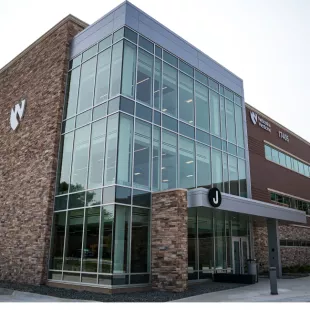Concerned about your fertility?
If you and your partner have been unable to get pregnant after a year of trying to conceive (six months if the woman is 35 or older), it may be time to see your doctor. It's important to know that infertility isn't just a female issue, when in fact, the male plays a role up to 40 to 50 percent of the time.
What causes male infertility?
Some men may experience symptoms related to infertility, including erectile dysfunction, inability to ejaculate, or a small volume of ejaculation. These issues can result in low sperm count, poor sperm movement, misshaped sperm or blocked sperm ducts. More often, a man will have no symptoms related to infertility, other than his inability to conceive.
Age is rarely a cause of infertility in men, although sperm count does decrease as you get older. Some of the most common causes of infertility in men include:
- Medication for certain conditions, including high blood pressure
- Testosterone replacement therapy, which can reduce or even eliminate sperm production
- Varicocele (dilated vein in the scrotum)
- Cancer treatments (chemotherapy, radiation)
- Genital trauma or surgery
- High alcohol consumption
- Regular marijuana use
How do you treat male infertility?
First, we will review your reproductive health history and collect a semen analysis. During this evaluation, we also like to meet with your partner to discuss her reproductive health history and what your goals are, together, for growing your family.
If the results of the semen analysis are abnormal, further evaluation will help determine the cause and appropriate treatment for your infertility. Depending on the patient, we may examine certain hormone tests to evaluate testosterone levels, along with other lab tests related to the hormone functions of the testicles.
Your doctor may begin by recommending certain lifestyle changes, including eating a healthier diet, exercising, or quitting smoking. If you are taking any medications that may decrease sperm function, we can work with your prescribing physician to find alternatives.
Depending on the cause of your infertility, we may recommend surgery or prescribe medication to help stimulate the body to produce more sperm. Surgery is the common treatment for varicocele, which improves sperm function in approximately 70 percent of men. At Nebraska Medicine, our fellowship-trained surgeon can provide patients with microscopic surgical techniques for varicocele, vasectomy reversal, and other procedures related to male infertility.
Why Choose Nebraska Medicine for Treatment of Male Infertility?
We provide advanced treatments for male infertility
At Nebraska Medicine, you will be treated by a board-certified doctor experienced in the treatment of patients with male infertility. We are fortunate to have the only doctor in the state of Nebraska who is fellowship trained to evaluate infertility in men, and help counsel and guide you through your options for treatment. We also offer microscopic surgical techniques for vasectomy reversal, varicocele treatment and other procedures related to male infertility.
We treat our patients as individuals
When it comes to male infertility there is no one-size-fits-all approach to diagnosis and treatment. We treat the whole patient, beginning with a careful evaluation of your overall health, lifestyle and medications in order to determine the root cause of your infertility. We take the time to get to know both you and your partner, working together with your primarily care physicians and other health professionals to help you reach your goals of starting or growing your family.
Our Locations
Highly ranked care
Nebraska Medicine is ranked among the nation’s best. Each year, U.S. News and World Report surveys the nation’s roughly 5,000 hospitals to come up with the year’s list of Best Hospitals. Just 3 percent of the hospitals analyzed for Best Hospitals earn national ranking in even one specialty. We were:
Ranked nationally in urology in the 2014 U.S. News & World Report Best Hospitals ranking
Recognized as a high-performing hospital in urology in the 2011, 2012 and 2013 U.S. News & World Report Best Hospitals ranking


